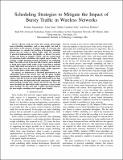| dc.contributor.author | Jagannathan, Krishna Prasanna | |
| dc.contributor.author | Jiang, Libin | |
| dc.contributor.author | Naik, Palthya Lakshma | |
| dc.contributor.author | Modiano, Eytan H. | |
| dc.date.accessioned | 2013-10-29T17:10:06Z | |
| dc.date.available | 2013-10-29T17:10:06Z | |
| dc.date.issued | 2013-05 | |
| dc.identifier.isbn | 978-3-901882-54-8 | |
| dc.identifier.uri | http://hdl.handle.net/1721.1/81839 | |
| dc.description.abstract | Recent work has shown that certain queue-length based scheduling algorithms, such as max-weight, can lead to poor delays in the presence of bursty traffic. To overcome this
phenomenon, we consider the problem of designing scheduling policies that are robust to bursty traffic, while also amenable to practical implementation. Specifically, we discuss two mechanisms, one based on adaptive CSMA, and the second based on maximum-weight scheduling with capped queue lengths. We consider a simple queueing network consisting of two conflicting links. The traffic served by the first link is bursty, and is modeled as being heavy-tailed, while traffic at the second link is modeled using a light-tailed arrival process. In this setting, previous work has shown that even the light-tailed traffic would experience heavy-tailed delays under max-weight scheduling. In contrast, we demonstrate a threshold phenomenon in the relationship between the arrival rates and the queue backlog distributions. In particular, we show that with an adaptive CSMA scheme, when the arrival rate of the light-tailed traffic is less than a threshold value, the light-tailed traffic experiences a light-tailed queue backlog at steady state, whereas for arrival rates above the same threshold, the light-tailed traffic experiences a heavy-tailed queue backlog. We also show that a similar threshold behavior for max-weight scheduling with capped queue lengths | en_US |
| dc.description.sponsorship | National Science Foundation (U.S.) (Grant CNS-0915988) | en_US |
| dc.description.sponsorship | National Science Foundation (U.S.) (Grant CNS-1217048) | en_US |
| dc.description.sponsorship | United States. Army Research Office. Multidisciplinary University Research Initiative (Grant W911NF-08-1-0238) | en_US |
| dc.language.iso | en_US | |
| dc.publisher | Institute of Electrical and Electronics Engineers (IEEE) | en_US |
| dc.relation.isversionof | http://ieeexplore.ieee.org/stamp/stamp.jsp?tp=&arnumber=6576469 | en_US |
| dc.rights | Creative Commons Attribution-Noncommercial-Share Alike 3.0 | en_US |
| dc.rights.uri | http://creativecommons.org/licenses/by-nc-sa/3.0/ | en_US |
| dc.source | MIT web domain | en_US |
| dc.title | Scheduling strategies to mitigate the impact of bursty traffic in wireless networks | en_US |
| dc.type | Article | en_US |
| dc.identifier.citation | Jagannathan, Krishna et al. "Scheduling strategies to mitigate the impact of bursty traffic in wireless networks." IEEE 11th International Symposium and Workshops on Modeling and Optimization in Mobile, Ad Hoc and Wireless Networks (WiOpt), 2013. | en_US |
| dc.contributor.department | Massachusetts Institute of Technology. Communications and Networking Research Group | |
| dc.contributor.department | Massachusetts Institute of Technology. Department of Aeronautics and Astronautics | en_US |
| dc.contributor.mitauthor | Modiano, Eytan H. | en_US |
| dc.contributor.mitauthor | Jagannathan, Krishna Prasanna | |
| dc.relation.journal | Proceedings of the 11th International Symposium and Workshops on Modeling and Optimization in Mobile, Ad Hoc and Wireless Networks (WiOpt) | en_US |
| dc.eprint.version | Author's final manuscript | en_US |
| dc.type.uri | http://purl.org/eprint/type/ConferencePaper | en_US |
| eprint.status | http://purl.org/eprint/status/NonPeerReviewed | en_US |
| dspace.orderedauthors | Jagannathan, Krishna; Jiang, Libin; Naik, Palthya Lakshma; Modiano, Eytan H. | en_US |
| dc.identifier.orcid | https://orcid.org/0000-0001-8238-8130 | |
| mit.license | OPEN_ACCESS_POLICY | en_US |
| mit.metadata.status | Complete | |
